Someone wanted a LED indicator built in and brought me a Vox V847A. (I'll get back to you on that later in this post.)
The sea-green one you've seen before and is a wah no more but a Uni-Vibe.
The red one is an occasion Vox V847 I saw for 50 euro's a year ago at Muziekhuis Westerhaven, Groningen.
I thought that was very cheap and when I saw it was an old one made in U.S.A it was a no-brainer to buy it.
 |
| Can you tell I like Vox-Wahs? |
My first Vox-Wah I bought somewhere around 1995 and I swear the enclosure was cursed, it died on me atleast 5 times and after that, when I used it for my own builds, every single circuit I built in it has given up on me at some point.
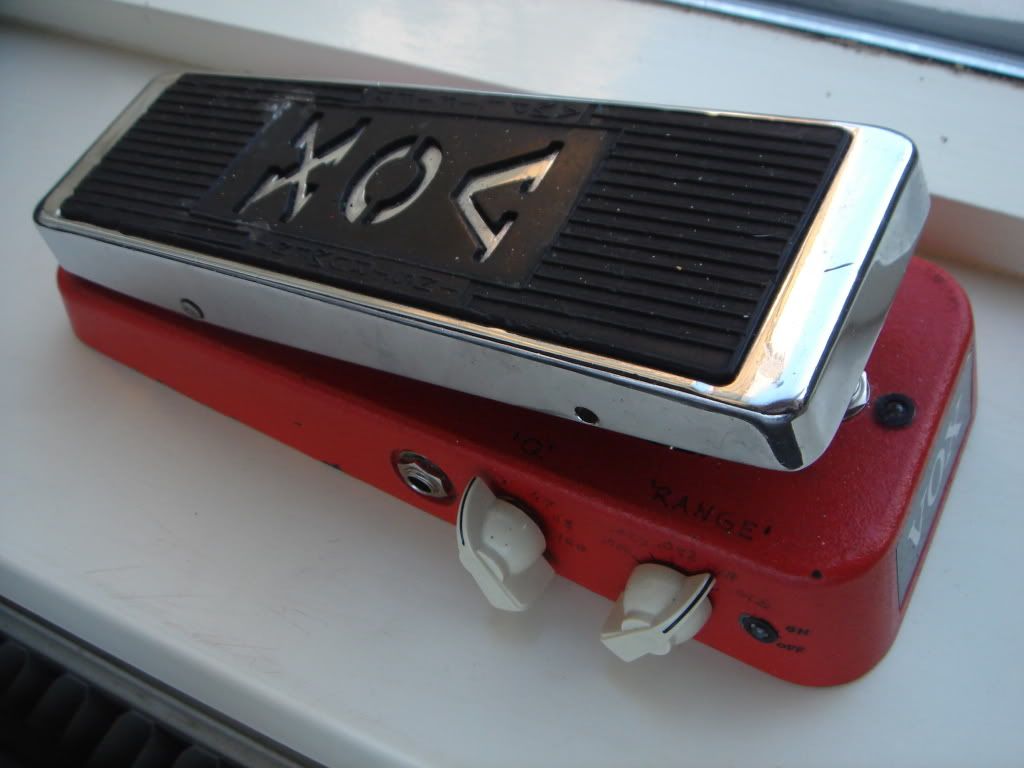 | |
| My old cursed Vox |
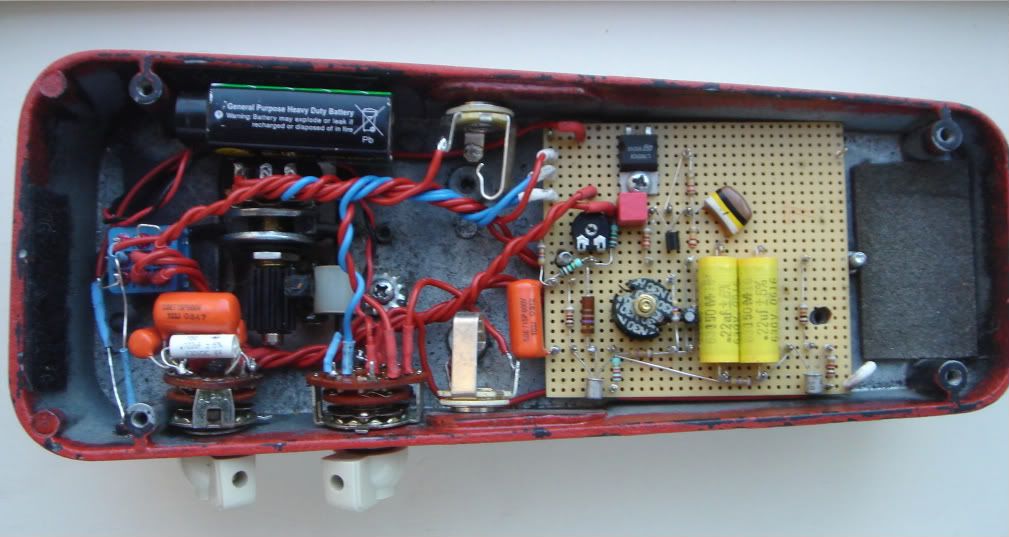 |
| The 4th rebuild (Dec 2010) and still dying out on me... |
Luckely this one just keeps going without any trouble. I did however, really miss the red colour so I decided to paint it.
In the spirit of; 'Take less of your pedals to work-Day', I decided to take my Germanium Treble-Booster off my guitar-strap and build it inside the Wah.
I made some stupid mistakes in the design and ended up with something that was very hard to mount inside the enclosure, let alone to wire and debug. I might rebuild it at a later point, but for now it will do.
I decided to keep the Wah's circuit-board I had modded earlier instead of building a new board, cause I was already happy with how it sounded. It has it's resistors changed to Carbon-Comps, its Capacitors changed to Tropical Fish-Caps I pulled from a '60s philicorda organ combo, and swapped the stock mpsa14 transistors for BC 109's.
 |
| A 9V+/9V- from one battery-circuit would have made sense, but I was broke and had to improvise |
I moved the wah's signal-switching from the switch at the toe-end to a relay mounted on the old vox's circuitboard, this way the wiring doesn't have to travel all the way from the pcb to the switch and back to the in/out jacks.
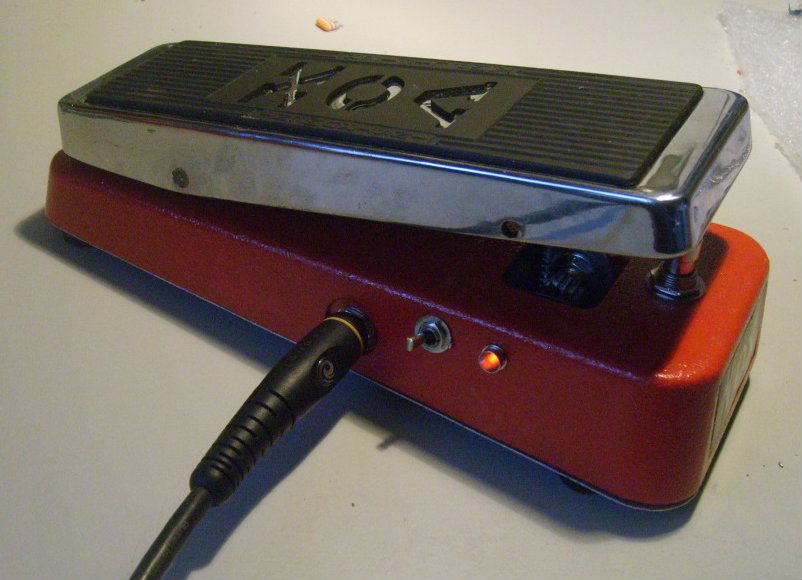 |
| The Treble-Booster's bypass-switch and status LED |
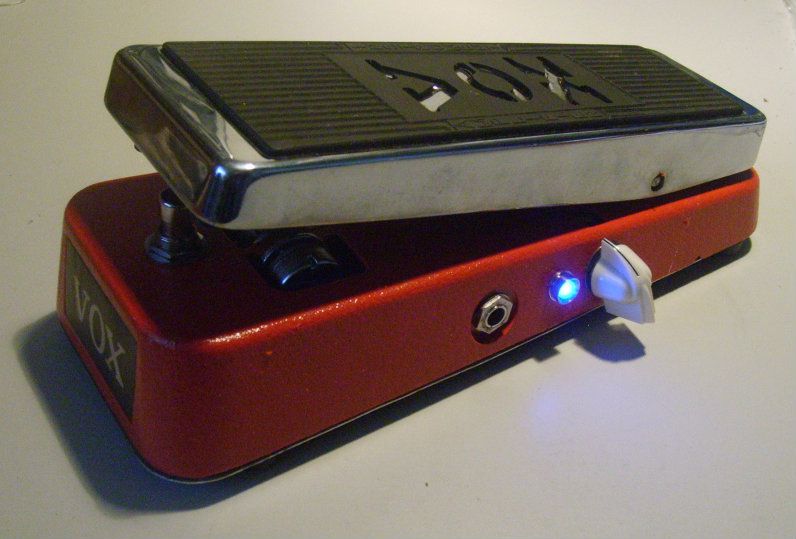 |
| Usually I hate bright blue LED's but I really wanted it to be visible from an angle. Also, I like fire-trucks... |
Now I wanted to share my thoughts about the Vox V847A.
This is the new production wah and is made in China. It sells for around 90 euro's.
I checked the Vox website and their current V847 doesn't have the 'A' designation so I don't know if they still sell these in the shops.
 |
| Vox V847A - Made in China |
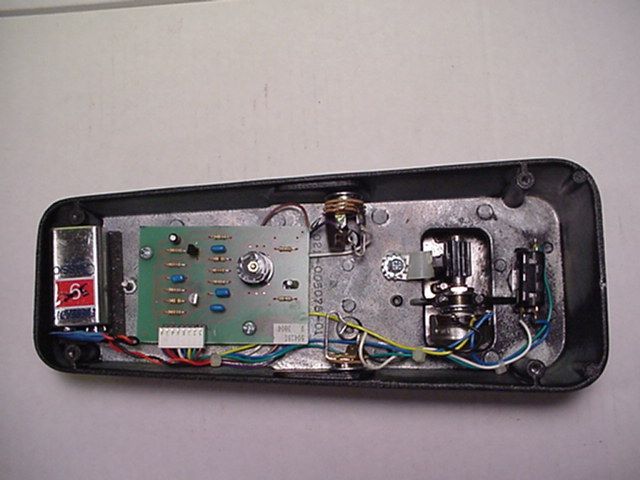 |
| 1994 Vox V847 - Made in U.S.A. |
While modifying this wah I noticed huge differences with the old made in U.S.A. -ones.
Made in China doesn't equal bad quality; The Squier Classic-Vibe series is build in China and are excellent guitars, not just for the price, granted they're cheap, but they're up there with much more expensive guitars, sound- and build-quality wise.
In the case of this Wah that sadly isn't the case. Not only does it sound very uninspiring, it seems they have cut corners on every single part.
The enclosure weighs less and has a more 'porous' sound to it if you tap against it with your nails. (It's easier to drill though!) All the other hardware including washers,nuts, jacks are of a flimsier,cheaper quality.
It's easy to notice the difference in circuit-boards; the old one has big through-hole components, on the new one most of it's resistors are underneath in the form of tiny SMD parts, so harder to modify or repair. (Vox did cut corners on the old one a bit with the little blue capacitors but you can modify that for just a few bucks)
The Potentiometer has a very weird taper; Its goes from 0.003ohms at the start to 10k at 11 o'clock, then it suddenly jumps from 12.30K to 86K between 11.30 and 13 o'clock, followed by the whole second half of the pot's rotation going from 101.4K to only 101.5K. Thats only 400ohms for half the sweep of your wah!!
I was very disapointed at Vox for making this version of their wah, and as a customer it's easy to get fooled into thinking this is of the same quality as the old one, because from the outside they almost look identical.
My advice would be, if you decide to look for a Vox-Wah, get a 2nd-hand made in U.S.A one,
They can be found for half the price and you'll have the real thing that's sturdier, easier to repair, mod and much better sounding at that.


No comments:
Post a Comment